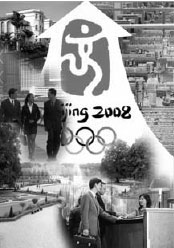People like to spot trends. I had some visitors from New York last week - people from the investment field.

They were curious to learn how the Olympics would affect China's economy - would it, as some say, be the peak of an unprecedented growth, to be followed by a slowdown, if not recession? Or would it start a new process and take the economy to a higher level?
To be sure, no sports event can directly give rise to a change in an economy. But if the Olympics, to be held in Beijing and a number of other Chinese cities in August next year, is an indicator, change is already taking place.
Even before the Olympics have come to town, there is widespread awakening to the fact that the rules of the game of development are changing, and the changes are becoming more specific.
At the time when residents of Beijing were celebrating the city's victory on being named the Olympic hosting city, whether sports fans or not, they could only vaguely tell that a major international event would most likely bring some benefit to their overall living standards.
At least, as they could tell, better roads would be built. Dirty smoke stacks would be knocked down. And the factories under the smoke stacks would be shut down or moved away.
The largest industrial relocation program China has so far accomplished was that of the Capital Iron and Steel Corp, which involved thousands of workers and their families.
Then there was the issue of air quality - as seen in the Beijing municipal government's recent experiment of cutting emissions by regulating the number of automobiles on the city roads.
This was done in a city where, if people can still remember, most households simply used coal stoves for heating and streets were filled by choking yellow smoke in the winter a little more than a decade ago.
There are things that still need to be done. Food security and quality for instance. In the last few years, China has had more than one food poisoning scare, reflecting the inadequacies in the supplying industries and rising concerns among health workers and consumers at large.
Something has been done to monitor the quality of food supplies to the future Olympic center. But that is too limited an effort. Not only athletes, but all consumers need the guarantee of decent food supplies, which the industry has yet to provide.

A campaign is needed across the business - from effectively regulating the quality of cooking oil used by roadside food stands to banning farmers from feeding their pigs with unhealthy restaurant waste.
People are becoming aware what all these changes add up to. They all have an environmental aspect. With the Olympics as a starting point, China's new urban middle classes will begin to measure their cities' development by a different environmental standard.
For industrialists, if they want to be successful, they will have to lead the change rather than just follow it.
The Olympics is helping the Chinese redefine their urban lives, and this will lead to new investment in environmental infrastructure.
With the central government's support, Beijing and Shanghai are doing better than most other cities. But they will be facing competition.
E-mail: younuo@chinadaily.com.cn
(China Daily 09/03/2007 page4)

